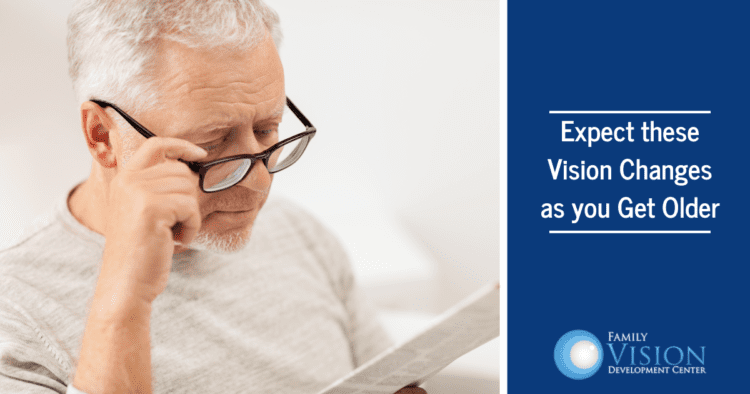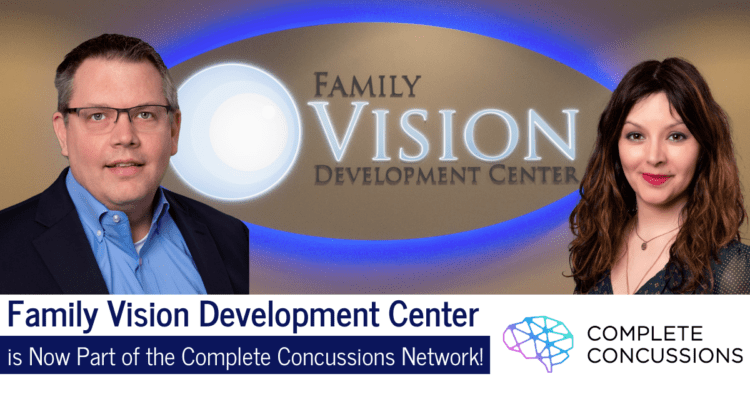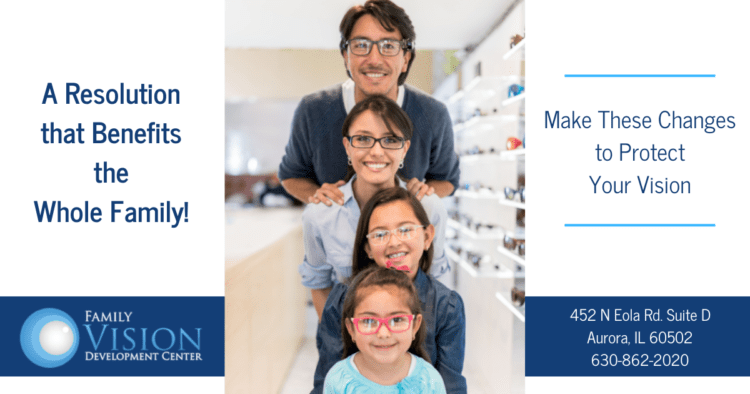Some things just get better with age – like wine, cheese or even a lasting friendship! But we can’t always say the same for our vision. Unfortunately, aging can bring about a number of visual concerns. Some can be serious, but others, like those below, are often simply an effect of getting older. On the bright side, while you may not be able to completely avoid these common issues, there are ways to help minimize the effects.
Vision Issues that Tend to Worsen with Age
- Presbyopia – this is the gradual loss of the eyes’ ability to focus on close objects or small print. Indeed, it tends to be one of the most common complaints of getting older, as reading becomes much more difficult and headaches become more common as a result. For mild cases of presbyopia, simply holding things farther away when reading or increasing the font size on your screen can do the trick. However, as it progresses, glasses or contacts in the appropriate prescription may be needed for comfortable vision.
- Dry eyes – this occurs when there are not enough tears, or insufficient quality of tears, lubricating the eyes. This condition is very common in older adults. In fact, the majority of people over age 65 experience some level of dry eyes. However, lubricating tears are important to keep the surface of the eyes smooth, clear and comfortable, as well as wash away any foreign matter or debris. Eye drops or artificial tear solutions can help combat symptoms. Better yet, to prevent a bad case of dry eyes, you can stay hydrated, use a humidifier at home and wear sunglasses
- Cataracts – cataracts are a clouding of the eye lens that causes changes in vision. For example, you may experience blurry or cloudy vision, double vision, light sensitivity or you may see halos around lights. Unfortunately, the biggest risk factor for developing cataracts is age, so you can’t avoid that. However, protecting your eyes with sunglasses or brimmed hats, quitting smoking and eating a nutrient-rich diet of fruits and vegetables can help to combat other known risk factors. And if they become too bothersome, they can be easily removed through a common surgery.
Eye Care at Every Age
No matter your age, an annual vision exam is essential in order to maintain proper eye health. Many eye diseases start without any symptoms and therefore go unnoticed for long periods of time, making treatment options more difficult in some cases. A comprehensive eye exam is the best way to detect these diseases in their early stages when treatment is most effective for preventing vision loss. Additionally, regular visits help us to quickly identify unusual vision changes, as well as provide guidance throughout the years to keep your vision strong for your lifetime.
It’s never too late to start taking proper care of your vision! The caring team at Family Vision Development Center is dedicated to providing the best vision care to all of our patients, at every age. Be sure to contact our Aurora location at 630-862-2020 to schedule an appointment today.
Family Vision Development Center is a full-service vision center offering innovative vision therapy services, post-concussive vision rehabilitation, comprehensive vision exams for eyeglasses and contact lenses, management of ocular diseases including glaucoma, diabetes, macular degeneration and cataracts, and a state-of-the-art optical center offering the latest designs in eyewear. We are dedicated to keeping our patients comfortable and well-informed and we will explain every exam and procedure and answer all of your questions. We accept both scheduled and emergency appointments, and offer convenient financing and insurance options to ensure that high-quality vision care is available and affordable to all of our patients.
Family Vision Development Center is excited to announce our new affiliation with Complete Concussions! Through this new relationship we are confident you will receive the most comprehensive concussion care, by coordinating important instructions and information amongst your providers.
Complete Concussions Overview
Coordinating concussion care can be difficult. But it is important for all of your concussion providers to be aware of other care you may be receiving. Indeed, this is the most effective way to ensure proper treatment and recovery. Complete Concussions is a global network of concussion care providers with one centralized location for patient referrals, care instructions, follow-up protocols and more. Their primary focus is concussion care and management using a network of specialists, clinics and providers worldwide. This network allows your concussion care to be coordinated among providers, coaches, etc. by gathering all important information in one place.
Family Vision Development Center as a Partner
Family Vision Development Center is proud to be included in the selection of trusted providers in the Complete Concussions network. Our concussion care professionals are trained in advanced neuro-optometric vision rehabilitation treatments that are often necessary following a concussion. Our inclusion in this network will allow primary care physicians, physical therapists, parents and others who may not know where to turn for these specialized services, to easily locate and contact our office. Additionally, they will be able to access progress updates, request more information, and coordinate long-term solutions.
Coordinating your Vision Therapy Following a Concussion
A concussion can cause changes to your vision. When this happens, it is known as post-concussive vision syndrome. A person who experiences a blow to the head that results in a concussion could experience problems such as:
- Eye focusing – not being able to quickly and easily see an object clearly (objects look blurry)
- Eye Movements and Tracking – not able to easily follow a moving object from one spot to another, or switch fixation from one object to another. Sometimes this can be reported by students saying that words are moving on the page.
- Depth Perception Issues – difficulty with accurately judging the distance between objects.
- Eye Teaming – not able to get both eyes to work together to focus on an object, often reported as double vision
- Peripheral Vision Loss – problems with your wide-angle field of vision, or feeling like you’re looking through a narrow tube
- Fatigue – more intense than normal, and not alleviated by rest
- Headaches – headache pain is common following a head injury and can range from dull to pounding or throbbing
- Memory – long-term or short-term memory loss can occur immediately following a concussion or can develop weeks, months or years after
Vision therapy is an extremely effective form of treatment for post-concussive vision syndrome that occurs following a head injury. This type of individualized neuro-optometric vision rehabilitation helps to retrain the visual system to restore proper communication between the eyes and brain. Any of the above visual issues can affect athletic or school performance, and precautions should be taken to ensure the safety and well-being of an affected student. Coordinated concussion care can alert parents, coaches and doctors when it is safe for an athlete to return to play or a student to return to normal classroom activities.
To learn more about our new partnership, get more information about concussion care or to schedule an appointment, contact us at 630-862-2020.
Family Vision Development Center is a full-service vision center offering innovative vision therapy services, post-concussive vision rehabilitation, comprehensive vision exams for eyeglasses and contact lenses, management of ocular diseases including glaucoma, diabetes, macular degeneration and cataracts, and a state-of-the-art optical center offering the latest designs in eyewear. We are dedicated to keeping our patients comfortable and well-informed and we will explain every exam and procedure and answer all of your questions. We accept both scheduled and emergency appointments, and offer convenient financing and insurance options to ensure that high-quality vision care is available and affordable to all of our patients.
Parents with a struggling student may be quick to assume a learning issue is the cause. However, a vision condition that causes difficulty with eye tracking may actually be what is behind the problems. Understanding what eye tracking means, the importance of this visual function, and how to correct this type of disorder can help parents stay on top of their child’s visual health as well as their success in school.
Why Proper Eye Tracking is Important
Eye tracking, also called visual tracking, is the eyes’ ability to work in sync with each other to accurately follow moving objects. Additionally, this visual skill allows for precise movements from word to word in a line of text.
Eye tracking movements are an essential part of healthy vision and are important in everyday life. For example, some activities that require proper eye tracking skills include:
- Quick scanning for information (while reading or in the world around you)
- Following or catching a ball while playing sports
- Focusing while jumping from one spot to another
- Reading a book
- Writing in a straight line
- Maintaining attention on a task
If a child’s eye tracking skills are not properly developed, it can negatively affect their reading fluency and comprehension, writing and spelling abilities, math skills, test scores and sports performance. Furthermore, this effect on overall academic and athletic performance not only affects their potential grades, but their overall self-confidence as well.
Common Signs of an Eye Tracking Problem
A child may not always realize that they are experiencing difficulty because of a vision problem. However, there are signs to watch out for that can indicate an eye tracking issue.
- Frequently skipping lines or words or losing their place when reading
- Poor comprehension when reading
- Confusing similar words
- Writing words, numbers or letters in reverse
- Reading below grade level
- Rubbing or squinting their eyes when reading
- Frequent drowsiness after reading for short periods
- Using a finger as a marker or aid while reading
- Reduced attention span when reading
- Eye strain or headaches when doing close-up work like reading or homework
- Complains that words seem to float or move around on the page
- Poor or illegible handwriting
- Difficulty playing sports
How to Correct an Eye Tracking Issue
If you notice any of the above signs or symptoms, the best precaution is to get a comprehensive vision exam to positively identify any vision issues. It should be noted that if a child gets results from a vision screening that indicate 20/20 vision, that does NOT necessarily mean that they have perfect vision. In fact, 20/20 vision simply means they are able to clearly see a specific letter on an eye chart at a distance of 20 feet. This standard screening is not able to accurately diagnose a vision disorder, such as an eye tracking problem.
It should also be noted that a child will not simply outgrow an eye tracking issue. In essence, in order to correct an eye tracking problem, you must take specific action. In our experience, the most effective form of treatment for an eye tracking problem is a customized vision therapy program. At Family Vision Development Center, our providers are highly-trained in advanced vision therapy techniques. These programs consist of specific eye exercises that strengthen the neural connection between the eyes and the brain in order to restore normal eye movements.
Contact us at 630-862-2020 to discover how vision therapy can provide an incredible solution to your child’s school struggles. We look forward to helping your child achieve healthy vision as well as reach their full academic potential!
Family Vision Development Center is a full-service vision center offering innovative vision therapy services, post-concussive vision rehabilitation, comprehensive vision exams for eyeglasses and contact lenses, management of ocular diseases including glaucoma, diabetes, macular degeneration and cataracts, and a state-of-the-art optical center offering the latest designs in eyewear.
As the start of a new year rolls around, many people look for ways to improve their life for the upcoming year. This can be accomplished in many ways, and is different for each person. But one thing everyone should be focused on is how to promote better vision. Our vision is precious, and maintaining healthy vision for life is an important goal. Luckily, there are some very easy changes you can make right away to get started on that journey.
Wear Sunglasses
One of the easiest and most significant changes you can make to your daily routine to promote better vision is to make sure you wear sunglasses. Every day. Without question. Many people really underestimate the importance of this simple action. But the fact is, the sun’s harmful UV rays can cause serious vision damage. Wearing sunglasses each time you leave the house can help protect against cataracts, macular degeneration and more. As a bonus, they do not have to be expensive glasses. In fact, as long as they indicate either “100% UV protection”, “protection against UVA and UVB” or “UV400”, they should be effective at blocking rays.
Add More Vegetables into your Diet
At this time of year, many people make a resolution to start eating more healthy foods. This is a great idea in general for better health. But it can also lead to better vision. Research has indicated that certain vegetables contain a number of vitamins and minerals that are known to promote better vision. For example, kale, spinach, sweet potatoes and carrots can be good sources of Vitamin C, Vitamin A, beta-carotene, antioxidants, lutein and zeaxanthin. These eye-healthy nutrients can be added in throughout your daily meals to help you build better vision for life.
Be Diligent with Contact Lens Care
After getting comfortable wearing contacts, it is easy to sometimes neglect your care routine. Unfortunately, this common mistake can lead to vision problems if it becomes a habit. The truth is, consistent care is essential to maintain healthy vision. In this respect, it is important to properly clean and store your contacts according to your doctor’s instructions. This means using appropriate cleaning solutions (not saliva or water), washing your hands before touching your contacts, and always keeping them stored in a clean case.
Take a Break from Digital Screens
It is so easy to become engrossed in digital screens. From computer screens at work to phones throughout the day, or television screens in the evening, it seems that our entire days are spent staring at screens. But too much of this can lead to digital eye strain, with symptoms like headaches, blurry vision, dry eyes, light sensitivity and more. For better vision, be sure to take frequent breaks from your screens. A good rule to stick to is to give your eyes a break every 20 minutes, by looking at least 20 feet into the distance for at least 20 seconds (think 20/20/20).
Commit to an Annual Vision Exam
Many people take the time to see their doctor annually for a routine physical to maintain their overall health. However, it is just as important to see your eye doctor for regular eye exams, as many vision conditions are only detectable through a comprehensive evaluation. Early detection can often give you a far better opportunity to fully correct an issue. Regular exams allow your eye doctor to detect any changes in vision right away, and begin treatment faster.
At Family Vision Development Center, we want to help you achieve better vision for life. We provide essential vision care services for patients of all ages, including vision exams, vision therapy services, post-concussive vision treatment, and a state-of-the-art optical center for eyeglasses and contact lenses. Contact us at 630-862-2020 to schedule your appointment today and make your vision a priority in the new year!




